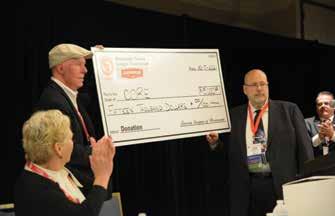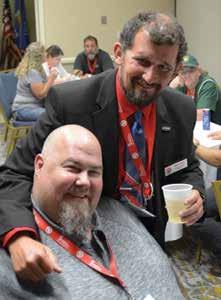
8 minute read
Giving Your Time to the TLW
The TLW makes it easy and beneficial to volunteer for the organization.
By Maura Keller
Volunteerism. It’s a word that can strike feelings of guilt in many. It’s on our “to-do” list or a part of our New Year’s resolutions. It’s something that we want to do, but just can’t find the time. Luckily, the TLW makes it easy. Plus, the association’s volunteer opportunities are not only plentiful, but they also often benefit both the TLW and the industry at large.
There are many ways to get involved in the TLW that go beyond your regular membership, according to Keith Kern, TLW president and owner of Jimmy’s Saloon in Superior. At the local league level, for instance, you can be elected for a board position, and serve as a president, secretary, treasurer or board member. In contrast, volunteering as a SafeRide® coordinator doesn’t require being in an actual board position. As Kern explains, the duties of this volunteer position include operating the SafeRide® program, keeping track of ride vouchers, filing monthly reports and working with the treasurer.
Many local leagues also have a separate foundation board to manage charitable activities. “This board may host fundraisers for the SafeRide® program, and donate to various events or groups in their communities,” according to Kern. Dan Taivalkoski, owner of The Beacon Tavern & Grill in Racine and TLW Search Committee chair, says that most local leagues plan and conduct special events and fundraisers, and local league leaders welcome assistance with those events. “If your local league has a SafeRide® program, you may be able to offer your services as a designated driver, too. Some leagues even compensate you for this. Most leagues also welcome members who may have an interest in a leadership role with the organization,” he adds.
Beyond those opportunities, many leagues additionally have committees that may work on various fundraisers, ticket distribution, event sponsorship, prize donations, etc. “If a board position seems like more time than one might have to offer, this is a great opportunity to help and volunteer,” acknowledges Kern.
Having been a TLW member for over 30 years, Bob Carpenter, treasurer of the Dodge County Tavern League, lets new members know that the best way to get to know people, and let others know about their establishment, is to volunteer. “This gets you great exposure and only costs you time,” confirms Carpenter, who owns River Rock Tap in Horicon. “The county tavern leagues require many hands to make all of the fundraisers successful — everything from getting signage and prizes, to setting up with the hosting place, to selling and collecting tickets, and manning the fundraising tables. Without help, none of the fundraisers would succeed.”
— Keith Kern, Jimmy’s Saloon
Often those who volunteer find their experiences inspiring, empowering and sometimes life-changing. They are given the opportunity to share their time and talents with the greater TLW community, and impact the various programs that the league offers throughout the year and across the state.
“You have the ability to help shape the TLW. You can bring creative ideas to the forefront and potentially see those ideas happen,” Kern says. “Attending local meetings and being involved usually gets you the important information right as it is released. Events like League Leaders Day are put on to help leaders further hone their skills and education. Some leagues may even cover some of the registration, lodging and mileage costs for some events if you are a board member.”
Taivalkoski adds that, by getting involved, you have a voice in how your local and state leagues are run, such as scheduling local dignitaries or law enforcement to speak. “Invite vendors that are relevant to the hospitality business to explain their products and services. You also have the ability to represent your local league as a delegate to elect members to serve on the TLW’s state Board of Directors and Executive Board,” Taivalkoski says.
Furthermore, volunteering is a great opportunity to see Wisconsin as TLW events are hosted all over the state. “Volunteering offers the opportunity to network and hear from peers all over the state about common problems and areas of interest,” Kern says. “Getting involved also helps make leagues stronger, and offers a bond that helps further validate why we exist and why we are so important to the industry. This is our livelihood. Why not help to make it better for all of us?”

How to Get Started
So what’s the best way to get started volunteering? From Kern’s experience, it begins with attending meetings and understanding the workings of the association. Ask questions, offer suggestions and volunteer to help whenever it works for you.
Taivalkoski says that, for many TLW members, the commitment of time and being away from their business is the biggest area of concern. That’s why he recommends starting at the local level, polishing your organizational skills and serving on a committee. “There are many tasks that can be accomplished on the phone or via email,” he says.
Carpenter adds that asking members to become involved in a specific project may help them take that first step in becoming an active volunteer. “Sometimes when we complain about how much work needs to be done for an event, we have to remember to ask other members to take a small part and do it,” Carpenter suggests. “Most people will be happy to help out, especially if they’re not doing the whole project themselves.”
And as Carpenter explains, every position has its own set of required skills. If you are a good public speaker, president may be for you. Good at taking notes and generating emails? Try your hand at being the secretary. Are you good with numbers and trustworthy? Every league needs a solid treasurer. Other board positions are great for people who like to ask questions and help organize events.
“The sky is the limit. Many leagues will welcome any help with open arms,” Kern says. “From there, the ball is in your court.” TLW
Volunteer Leadership Positions at the TLW
“At the end of the day, the member is most important, but each level of leadership works to carry out members’ needs, concerns or direction,” explains Keith Kern, TLW president. • League Positions: These volunteers work within their respective counties. They carry out the duties required by their position and make sure the mission is being followed through. • Board of Directors: These positions are elected by their respected caucus and appointed to various committees. They meet four times a year as a full board to conduct business, but depending on their committee, they may meet more. They are also assigned areas of responsibilities within their districts and work with local league leaders. • Executive Board: These elected positions are voted on by the members of the district in which they fall. In addition to the full board meetings listed above, they also meet during the months in between. At times, special meetings are called to address individual issues or concerns as well. While these executive board members sit on committees, they additionally work to oversee all areas within their districts and offer help when needed. • State President, Vice President,
Secretary and Treasurer: These positions require statewide elections and follow most of the same rules that apply to local levels, but on the state level.
Working closely with staff, they help oversee all operations, and bring initiatives to the executive board and full board.
HOW TO REDUCE FRAUD IN YOUR RESTAURANT
What Does Restaurant Fraud Look Like?
Occupational fraud is quite common, especially with a large staff. Combine this with overlapping multiple shifts and employee turnover, and it’s the perfect opportunity for fraud to occur in your restaurant.
Below are some red flags to look for:
• Employee lifestyle changes (expensive cars, jewelry, homes, clothes) • Significant personal debt and credit problems • Behavioral changes (an indication of drugs, alcohol, gambling or fear of losing the job) • Refusal to take vacation or sick leave (many violations are discovered while the perpetrator is on vacation) • Lower deposit amounts than expected on busy days
Make Employee Fraud Recognition Part of Your Training
Teach employees and managers the impact fraud can have on the restaurant, what constitutes fraud, the warning signs of fraudulent activity, and how to report suspicious behavior. It’s important that business owners have a restaurant fraud reporting system in place as employee tips are what most often uncover occupational fraud.
Implement Internal Controls
Internal controls help ensure efficient operations, compliance with laws and regulations, safeguarding of assets, and accurate financial reporting.
Conduct Background Checks
It’s also a best practice for restaurant owners to conduct extensive background checks on those who have access to company funds and other resources. By being able to identify potential red flags, making the topic part of employee training, and implementing checks and balances, you will be taking action to reduce the risk of business-damaging events.
To learn more about how Society Insurance can help your restaurant grow and mitigate risk, consult with a Society agent in your area.
This information is provided as a convenience for informational purposes only. It does not constitute legal or professional advice. It is provided to assist you in recognizing potential unsafe work problems or conditions, and not to establish compliance with any law, rule or regulation.
it’s all in the details


TRIED-AND-TRUE RESTAURANT & BAR COVERAGE WITH NO SURPRISES. SMALL DETAILS. BIG DIFFERENCE.
Long-standing industry expertise means that nobody understands the unique challenges of protecting your hospitality business better than Society Insurance. Offering tried-and-true specialized programs, we are proud to provide comprehensive coverage for restaurants and bars.
Find an agent & request a quote at

